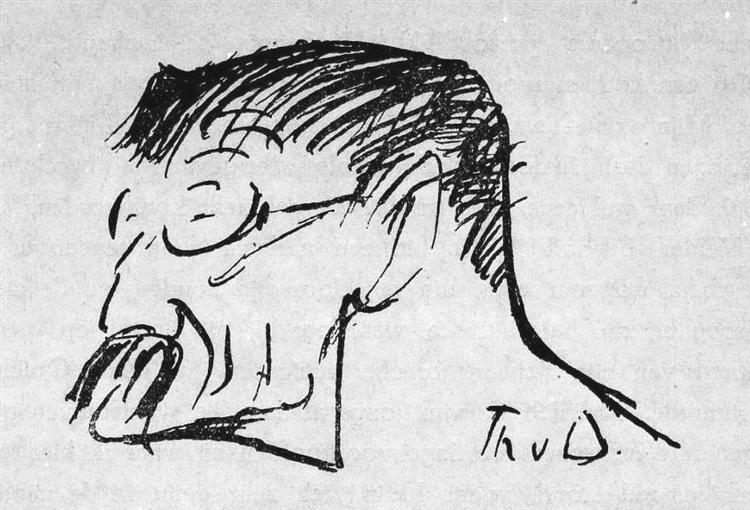Description
The work "Portrait of A. J. J. de Winter" by Theo Van Doesburg, made in 1916, is a significant example of the style and innovative aesthetics that characterize the Dutch artist, as well as the avant -garde that represented the STIJL movement. In this painting, Van Doesburg distances itself from the traditional conventions of the portrait, creating a representation that fuses the identity of the subject with the abstract conception of modern art.
In the foreground, the portrait presents the intellectual A. J. de Winter, an outstanding art critic and contemporary poet, whose image is built from a bold use of color and shape. The figure is represented in a simplified and geometric way, integrating into a dynamic background that reinforces the interaction between the subject and its environment. The colored palette is deliberate and subtle, with tones of blue, black, white and red touches that emphasize the personality of the portrayed, generating an atmosphere of brush sobriety and vitality.
What stands out of this work is the way in which Van Doesburg uses lines and plans to decompose the figure of De Winter, using an approach that simultaneously suggests both depth and two -dimensionality. Each segment of the portrait seems to claim a dialogue with the architecture of the pictorial space, melting the figure with the background in a harmonious interrelation. This technique, so characteristic of neoplasticism, emphasizes not only the individuality of the portrayed subject, but also the search for a deeper reality through abstraction.
This portrait is not limited to capturing a face; It is proposed, however, explore the mental state and essence of De Winter through the form and color, reflecting the ideal of Stijl of an art that transcends the merely representative. The use of geometry in the composition also places the work within a broader context of the art of the early twentie The visual elements were essential.
Although "Portrait of A. J. J. de Winter" is less known compared to other works by Van Doesburg, invites a deep reflection on the possibilities of portrait in modern art. The author's ability to combine his unique vision with the theme of the portrait resonates with the contemporaries of the Stijl movement, who also sought to challenge and expand the limits of representation. In this sense, the work is not only a testimony of Van Doesburg's talent, but also a significant contribution to the evolution of the portrait in the context of abstract art.
Thus, this portrait, less for its uniqueness as a masterpiece and more for its representation of an era and an artistic current, is erected as a fundamental example to understand the transition to a modern aesthetic that, although it may seem distant from the personal and emotional In the representation of the individual, it responds to the concerns of an era in transformation. Van Doesburg's work continues to be relevant, not only for its technical and aesthetic quality, but for its contribution to the idea that art can be a reflection of the thought and collective experience of its time.
KUADROS ©, a famous paint on your wall.
Hand-made oil painting reproductions, with the quality of professional artists and the distinctive seal of KUADROS ©.
Art reproduction service with satisfaction guarantee. If you are not completely satisfied with the replica of your painting, we refund your money 100%.

